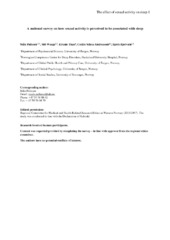A national survey on how sexual activity is perceived to be associated with sleep
Peer reviewed, Journal article
Accepted version
Permanent lenke
https://hdl.handle.net/1956/22040Utgivelsesdato
2020Metadata
Vis full innførselSamlinger
Originalversjon
Sleep and Biological Rhythms. 2020;18:65-72 https://doi.org/10.1007/s41105-019-00246-9Sammendrag
There is a paucity of studies investigating how sexual activity is perceived to influence sleep, despite conceptions about significant gender differences regarding this issue. In all, 4000 persons, aged between 18 and 55 years, were randomly drawn from the Norwegian Population Registry and invited to participate in a postal survey. The respondents were asked how sexual activity with another person, with or without orgasm, and how masturbation, with and without orgasm, influenced sleep latency and sleep quality. A total of 1080 persons participated (response rate 28.2%) of which 56.1% were women. The mean age of the sample was 38.7 years (SD = 10.8). Sexual activity with an orgasm was perceived to have a soporific effect by both men and women. Sexual activity with another person, with an orgasm, was perceived to have a relatively stronger effect on men compared to women in terms of sleep quality. Sexual activity without an orgasm was by men reported to have a sleep impairing effect, whereas the perceived effect reported by women was equivocal. Sexual activity with orgasms was perceived as having a soporific effect in both men and women. Sexual activity without an orgasm had an equivocal perceived effect on sleep.
